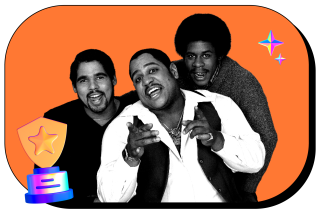Top R&B; label you didn’t know
This seems like an easy pop-music trivia question: Name the first hugely successful African American-owned record label. Here are even a couple of hints: The company was located in the Midwest and one of its first hits was by Gladys Knight & the Pips.
Motown, right?
The answer is Vee-Jay, a Chicago company that despite specializing in R&B; and gospel may be best known today because it released one of the Beatles’ earliest hits. The label was also home briefly to the Four Seasons.
Indeed, one of Vee-Jay’s most famous albums featured Beatles songs on one side and Four Seasons songs on the other in a sort of battle of the bands, complete with such teasing cover tag lines as “Each Delivering Their Greatest Vocal Punches.”
Beneath the excitement of those groups, however, the heart of Vee-Jay centered on an engaging body of work by such distinguished R&B;, blues and gospel artists as John Lee Hooker, Jerry Butler, Jimmy Reed and the Swan Silvertones.
This legacy is saluted in “Vee-Jay: The Definitive Collection,” a new, four-disc set from Shout! Factory. You won’t find the Beatles in the package because Vee-Jay’s rights to those records expired. But there is one Four Seasons track (“Sherry”), along with 85 other tunes including the little-known, original version of Jerry Leiber and Mike Stoller’s song “I’m a Woman” and an unreleased version of Hank Ballard & the Midnighters’ “The Twist.”
The back story: There were other black-owned record labels in the ‘50s and ‘60s, but none with the wide-ranging success of Vee-Jay, whose accomplishments in turn surely influenced young Berry Gordy’s Motown dreams.
Vee-Jay got off to a dramatic start in 1953 when Vivian Bracken and her husband James (hence the name Vee-Jay) borrowed $500 to record a high school vocal group called the Spaniels. One of the tunes, “Baby, It’s You,” climbed to No. 10 on the national R&B; chart on Chance Records. The Brackens recognized the potential in the single, but they didn’t have the money to distribute “Baby, It’s You” (not the same song later associated with the Shirelles), so they leased it to Chance.
When the Spaniels came back a few months later with an even bigger hit, the ballad “Goodnite Sweetheart, Goodnite,” however, it was on Vee-Jay, and the Brackens were on their way.
The connection to Chance Records also proved important to Vee-Jay in a second way. Ewart Abner, a savvy record man, was apparently so impressed by the Brackens that he left Chance to manage and eventually serve as president of Vee-Jay. Vivian Bracken’s brother, Calvin Carter, also joined the Vee-Jay team early, bringing with him a good ear for talent.
By the early ‘60s, the Vee-Jay catalog included such hits as John Lee Hooker’s “Boom Boom,” Jimmy Reed’s “Baby What You Want Me to Do,” Jerry Butler & the Impressions’ “For Your Precious Love” and the Pips’ “Every Beat of My Heart.”
But nothing compared, in terms of sales, to a single that Vee-Jay picked up from EMI after its U.S. subsidiary, Capitol Records, passed on it: the Beatles’ “Please, Please Me.” Though the Vee-Jay single flopped when released early in 1963, it rocketed up the charts after the success of “I Want To Hold Your Hand” on Capitol in 1964.
That association didn’t last long. Capitol quickly claimed all rights to future Beatles recordings, and the Four Seasons found a new home at Philips Records after Vee-Jay reportedly had cash flow problems.
“Vee-Jay’s owners were not as shrewd at watching the bottom line as they were at spotting talent,” author-critic Nelson George said in a book quoted in the liner notes. The label closed its doors in 1966.
Backtracking, a biweekly feature, highlights CD reissues and other historical pop music items.
More to Read
The biggest entertainment stories
Get our big stories about Hollywood, film, television, music, arts, culture and more right in your inbox as soon as they publish.
You may occasionally receive promotional content from the Los Angeles Times.










